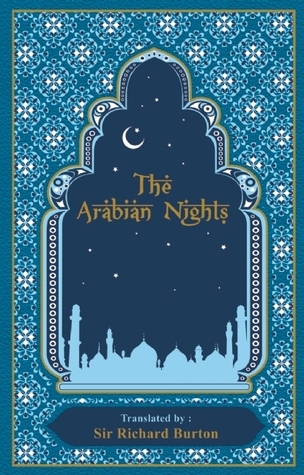What do you think?
Rate this book


672 pages, Leather Bound
First published January 1, 800











Eyes like two stars and hair as black as nightShe glanced with displeasure on the Maghrabi; but Rashid, heeding the magician's rede, rubbed the ring and commanded the Marid. The Maghrabi spake some words to the girl; and instantly her aspect changed, and she did with goodly gree suffer the Maghrabi, for all his hideousness, to kiss her and toy with her, and presently to disrobe her of her gold-purfled dress and even of her petticoat-trousers and know her carnally², whereby she joyed with great joyance. "Now command the Marid to take us hence," said the Maghrabi without even making the Ghusl-ablution, for he was a Kafir; and again Rashid commanded the Marid, and they made good their escape, leaving the Caliph's concubine swooned on the ground.
Lips ruby red caught in a winsome pucker
So fair a maid I ween ne'er crossed my sight
To look on her is aye to wish to embrace her.
♪♫♪ A whole new worldI grew up with mostly Filipino komiks around me. Only my father loved reading books and we had very few (compared to what I have now) classics and contemporary books at home. My parents did not read to me when I was young. Those are the reasons why I missed all those children's books. So, reading these Tales from 1001 Nights a.k.a., The Arabian Nights was like going back to the komiks time in the province. You see, the story of Aladdin and the Magic Lamp, although I read it just now, is so popular that we must all have seen it in movies, read in local adaptations as individual children's books or comics or even seen in TV ads. However, if you compare the original story to the Disney-produced movie, the carpet in the book does not fly. Rather, it just covers the distance between the entrance of the King's palace and Alladin's pavilion so that the princess, Lady Badar Al-Budur (maybe the equivalent of Princess Jasmine) will not walk on mud. The story is fantastic. I admire how the magician thinks: cunning and devious. I hate Alladin before he got rich particularly on his laziness and how he treats his old mother.
A new fantastic point of view
No one to tell us no
Or where to go
Or say we're only dreaming ♪♫♪
♪♫♪ A-li-ba-ba... A-li-ba-ba... ♪♫♪I still remember the theme and my sister used to mimic it. Low key. She marches like a soldier and with eyes wide and scary. The other tale that I liked was Ali Baba and The Forty Thieves. Who would not remember ourselves shouting: Open Se-sa-me! when we saw a closed door when we were kids? Then expecting our mom or playmate to open it for us? Who says that this book treats women badly? In this tale, the maid Morgiana is so smart that she saves his master's (Ali Baba) life several times.
♪♫♪ Sinbad the SailorI tried looking this up for lyrics but I think that there is a popular Hindi rock song with the same title. I remember the tune and I thought that it is similar to "Popeye the Sailor Man" or maybe as catchy as that. Well, the tale of Sinbad the Sailor is a short one and it talks about is mistake of killing his falcon. It is one of those tales inside another tale.
Sailing through the seas... ♪♫♪
